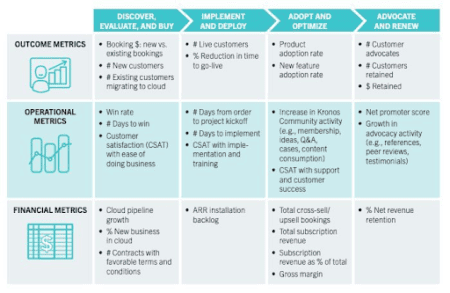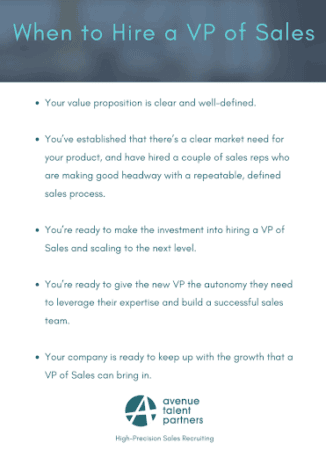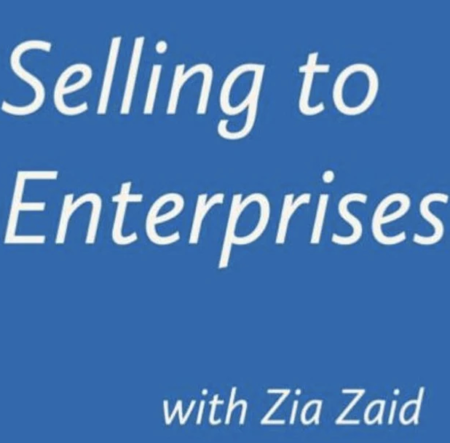
Why You Don’t Need to Hire a CRO For Your Startup
Hiring a chief revenue officer seems like the perfect way to catapult your startup’s growth, right?
Especially when you’re interviewing “the one” and the only way they’ll take your offer is if they have the “C” in front of their title.
If they could just come in and start driving revenue across all your departments, you’d be crazy to hire this person. With everything cleaned up, your startup could finally start making significant progress to achieve true scale.
Cue a bubble bursting. Or several.
Hiring a chief revenue officer (CRO) may sound good in theory, but the reality often doesn’t work out like this. Even worse? It costs your business at 7-figures while setting it back.
See, there’s a right time to hire a CRO for your business, and the majority of the time it’s smarter to wait on that idea and hire a VP of Sales instead.
So we’re taking a deep dive here to discuss what happens when you hire a CRO too soon, the difference between both roles, and which one’s a better hire for your startup today.
You may be surprised to learn that your startup isn’t actually ready to hire a CRO when you find out:
What Happens When You Hire a CRO Too Soon
I know you’re here to see if a chief revenue officer is right for your startup, and I promise to get you there. But I’d be remiss if I didn’t share these two stories to put into perspective first:
The One About the CRO Who Got In Over Their Head
Before working with us, one of our clients didn’t finish their year strong like they anticipated, and it carried over to the following year where they had an even more dismal start.
The root cause of the problem? They hired a CRO who was in over their head, floundering, and not sure what to do to turn things around.
In short, the CRO never had a true seat at the table, they weren’t able to properly forecast, and they put forth the wrong strategies because they hadn’t seen this stage of startup before.
This CRO was also handed an unrealistic number to reach without ever being consulted, which ultimately didn’t happen as they hadn’t fully reached product-market fit (PMF). So rather than bringing in the $5.2 million the company projected (an enterprise market concentration), they finished with a measly $500,000 team total. And a whopping $4.7 million short of their projection.
How could that happen?!
The company decided to quadruple its pricing based on what it thought their product was worth NOT what the market was responding to. And since the CRO didn’t know any better (because they’d never been through this before), they chased dollars that were never there for theirs for the taking in the first place. Also when his strategy fell short, the CRO sold his team down the river.
Our client ended up pricing themselves out of the market and completely tanked their sales… setting themselves, the team, and the CRO WAY back.
They also drastically increased their churn rate: going from a 4.5% churn rate to 62%, a 13x jump!
All this snowballed into an even bigger disconnect between the Board, CEO, CRO, the sales team, and their customers.
And since they didn’t have a solid brand reputation, track record, or go-to-market strategy (GTM) to support these unrealistic targets, they suffered tremendously.
I wish we could say this was our only client that made this mistake…
The One About The CRO With The 85% Churn Rate
One of our clients came to us after over-hiring… not the first time and sadly, it won’t be the last I’m afraid.
They hired a CRO (whom they overpaid), and this person didn’t have a clue about how to build at the stage this company was in.
Though this CRO knew how to delegate, they didn’t like getting their hands dirty in the tactical details, lacking both infrastructure and support from the company.
They also struggled to develop a winning GTM strategy and couldn’t address the challenges, obstacles, or needs of the business to create solutions on their own (or be bothered to actually follow through on them).
So, like our first example, the company increased its prices to make up for all the revenue they assumed they’d bring in… another painful idea from the CRO.
Unfortunately, this toppled their single-digit churn rate of 3% to a whopping 85%.
As you can probably guess, the company then had to pay this CRO a seven-figure severance package.
Sadly, the company was literally dangling by a string by the time they reached out to us.
A similar situation can happen when you hire a VP of Sales too early.
These examples are just two of the countless stories I see and hear about all of the time.
Hiring a CRO too early is a recipe for disaster. It can kill your sales team, destroy your ability to keep your customers, crush morale, and create a revolving door of turnover, and so much more.
This is exactly why I think both companies in these examples would’ve been better off hiring a VP of Sales FIRST.
Understanding the Difference Between a CRO vs. VP of Sales
If you’re not sure about the responsibilities or ultimate goals of a CRO vs. VP of Sales, let’s briefly touch on the differences between these two roles:
How a CRO Can Help Your Business
The responsibilities of a chief revenue officer are right in the name: they drive the strategic vision to drive, retain, and grow revenue… across the function.
They are executive leaders of leaders.
While a VP of Sales hones in on generating revenue through sales, a CRO drives revenue across all areas of your business that touch revenue.
A CRO will evaluate and set the strategic direction in each function with a leadership team driving the plan for them — from marketing and sales to customer success and implementation — to see where tweaks can be made along with new opportunities to capture to bring in more revenue.
Think of CROs like the glue connecting all your customer-facing departments around a shared goal: to drive revenue.

Because of this, a CRO may be able to help your startup further down the road once you’ve reached the scale stage, needing to bring cohesion amongst the entire revenue function. A CRO worth their salt will galvanize the team while creating a strategic plan to think through the complete buyer journey.
But that’s likely not what your startup needs if you’re at the validation, build, or growth stage as we’ll discuss later.
Right now, you’re better off learning:
How a VP of Sales Can Help Your Startup
A VP of Sales is all about building and optimizing the sales function.
This is where things get tricky as there isn’t a one-size-fits-all VP of Sales. There are 48 different kinds of sales leaders, so it’s critical that you choose wisely.
Before you reach that coveted “unicorn” status, requiring a CRO, there’s a lot of work to be done to drive revenue and growth. It’s refining what’s been validated, building, nailing, and growing.
The biggest difference between the two functions is the stage of business and the work required to do that stage well. Simply put, the CRO is a strategic executive leader of many functions and leaders. Getting to that point sreams the need for a Head of Sales, VP of Sales, EVP of Sales, or an SVP of Sales.
When you focus on your business, the stage, and work required to do it well, the right kind of sales leader needed to help you grow to the next level is clear.
So now we finally get to the big reveal:
CRO vs. VP of Sales: Which Is Right for Your Startup?
Is your startup at the right stage to hire a CRO?
Or do you really need a VP of Sales?
Let’s break down a few scenarios to see where your startup falls.
You Should Only Hire a CRO When…
You’re having big issues between your departments, achieving internal alignment is the name of the game, and the growing pains along with the lack of a strategic vision are painful.
But don’t get caught up in the shiny objects assuming this is what your startup actually needs…
Why You Don’t Need To Hire a CRO For Your Startup
See, it’s easy to get caught up in the idea of adding a CRO. After all, who wouldn’t want someone at their startup hyper-focused on unifying departments and driving revenue at scale?
But there’s a big difference between being a builder, an optimizer, and a maintainer/grower.
And if you’re an early-stage startup, you need a builder and optimizer.
Bad news? CROs are usually maintainers/growers.
So if you make the costly mistake of hiring a CRO that doesn’t fit your needs, you’ll end up spending far more than necessary, have little to show for it, and setting your business back.
The work you really need to accomplish to continue to sustain and grow won’t get done. The revenue you expected to earn won’t be there… making it difficult to realize those goals you’ve laid out for the business.
And you’ll need to pay your CRO handsomely while they’re in their role and pay out a hefty severance package when you ultimately part ways.
It’s a painful disaster.
So ask yourself this: Are all my departments really disjointed, do we have a cohesive and strategic vision that’s working, are we losing money across the organization, or do I just need someone to build up and boost sales?
When To Consider Hiring a VP of Sales
Some questions to consider that point to timing:
-
- Do you understand your market and buyer journey?
- Do you have customers yet?
- Is your revenue growing?
- What does your sales process look like?
- Do you know why your customers buy, why they stay, and why they leave?
- How repeatable is your process?
- What does your Marketing engine look like?
- Is the product ready (especially for enterprise customers that require customization or integrations)?

A smart VP of Sales will know exactly how to build a playbook that helps you create a solid foundation to build upon. They’ll step in to refine, fix, nail and grow to push your sales needle to highs you only dreamed of. They’ll come to the rescue to help you and your startup:
- Figure out why revenue targets are being missed.
- Custom-craft a plan to address the problem(s) at the root.
- Create a repeatable, measurable, scalable process with the metrics and forecast to back it up.
- Focus on your customers.
- Perfect your go-to-market (GTM) strategy.
- Grow your sales team for record-breaking growth.
Hiring a VP of Sales for a startup is a wise move when the time is right. In that guide I just linked, you’ll learn how to know when it’s really the right time to look for one and how to get this hire right.
First time ever hiring a VP of Sales or considering one? Read about how to hire your first VP of Sales.
While you may already have a good idea of which direction is right for your startup, there are a few more things to consider before making your final decision:
Before You Hire a CRO or a VP of Sales, Read This
No matter which direction you take, it’s important to get crystal clear about what needs to be done at your startup today and in the near term. Seek to understand, not assume.
If you’re thinking a CRO can help your growth plan in the long haul, you still won’t have anyone to devise or implement tactics to thrive in the short-term. At that rate, your startup may not be around long enough to even need a CRO by then.
That’s why you must know what you need, the work required to thrive, and why, especially if you’re an early-stage startup. You can’t afford to make mistakes with this decision; it could literally cost you your business.
So use our secret sauce for success to help you narrow down what you’re really looking for, and the type of help, skills, and experience your startup can use and most benefit from now. And then double down on the power of an effective interview process.
